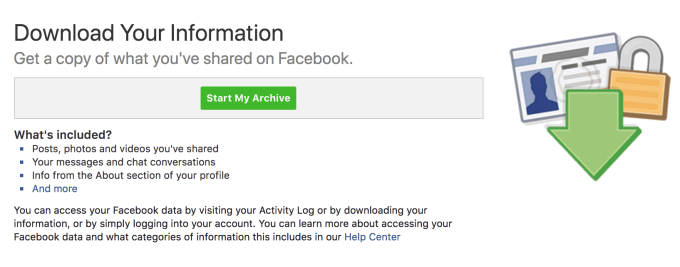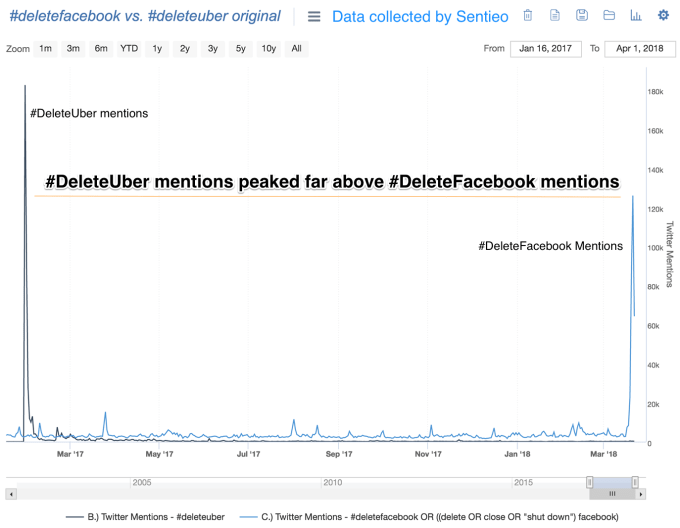Instagram traps data without a Download Your Information tool
It’s hard to #DeleteFacebook with no viable alternative, but at least you can export all your data. There’s no such option on Instagram . That lack of data portability puts users at the mercy of Instagram’s product and policy decisions. And it could even put users at risk, as those who seek to back up their accounts and content are forced to use unofficial third-party apps that require their password.
Facebook launched its Download Your Information tool in 2010, six years after the social network launched. It lets you export a zip file of all your status updates, photos, profile info, messages, friend lists and a whole lot more. The idea is that if you wanted to ditch Facebook, you could take your data with you and get set up on some other social network. The fact that you only get a list of your friends’ names by default, not their email addresses or another way to easily find them on different apps, limits that power. But at least you get all the content you created.

Soon to be eight years old, Instagram still lacks its own version of Download Your Information. When asked about this, an Instagram spokesperson merely said, “Instagram does not currently have a data portability tool.”
Instagram doesn’t even offer a way to download your photos or videos after you share them to its feed. Unlike most apps and websites, you can’t just tap and hold on a photo to save it to your phone. The closest option is to use Instagram’s “share via email” feature, which sends a saveable version of an image. Otherwise, you need to set Instagram to save images when you post them.
 Third-party tools have cropped up to fill the gap, but their security and privacy practices can be questionable. Vibbi InstaPort, Insta Saver, 4K Download and Picodash are a few. These services typically require you to log in with your Instagram credentials, which puts your username and password at risk of leaking to hackers. It’s also unclear what else could happen to your images once they export them. And the fact that some of these services, like InstaPort, offer to sell you Instagram followers too shows how scammy they can be. Perhaps the best bet for users is this open-sourced InstaLooter tool, but it requires some technical know-how to retrieve your photos and videos.
Third-party tools have cropped up to fill the gap, but their security and privacy practices can be questionable. Vibbi InstaPort, Insta Saver, 4K Download and Picodash are a few. These services typically require you to log in with your Instagram credentials, which puts your username and password at risk of leaking to hackers. It’s also unclear what else could happen to your images once they export them. And the fact that some of these services, like InstaPort, offer to sell you Instagram followers too shows how scammy they can be. Perhaps the best bet for users is this open-sourced InstaLooter tool, but it requires some technical know-how to retrieve your photos and videos.
The rest of your profile information, photos you’re tagged in, people you follow or who follow you, your Likes and comments and any other Instagram data is all trapped in the app. The European GDPR privacy law goes into effect on May 25th, so Instagram may need to offer a data portability tool by then. Perhaps Congress should ask Zuckerberg about this during his testimonies over the next two days.
The problem is that without portability, there’s less chance of a legitimate rival to Instagram emerging. Snapchat’s ephemerality makes it too different. That absence means there’s nowhere to go if users are fed up with Instagram’s algorithm or other issues. This is partly why the #DeleteUber campaign peaked much higher in terms of Twitter mentions than #DeleteFacebook, despite having a much smaller user base. Those pissed at Uber could switch to Lyft without changing their behavior much. There’s no equivalent alternative to Facebook or Instagram.

#DeleteUber peaked higher than #DeleteFacebook because apps like Lyft give Uber users a viable alternative. An Instagram Download Your Information tool could promote competition.
The U.S. government may have been shortsighted to let Facebook acquire Instagram in 2012 for $715 million. Now at more than 800 million monthly users, Instagram joining Facebook led to a massive centralization of social networking that gives users fewer options. But even with the backlash against big tech and Facebook, it seems unlikely that the government has the resolve to break up Facebook, Instagram and WhatsApp.
At the very least, Instagram should give users the ability to leave without losing their visual history. If Instagram and Facebook are going to remain united as one company, the same data portability tools should be available to both. That way, if someone actually did build a decent competitor, users could choose where they want to put their windows to the world. At the Download Your Information tool launch in 2010, Facebook CEO Mark Zuckerberg himself said, “Stuff that you put into the site, you should be able to take out.”
Powered by WPeMatico